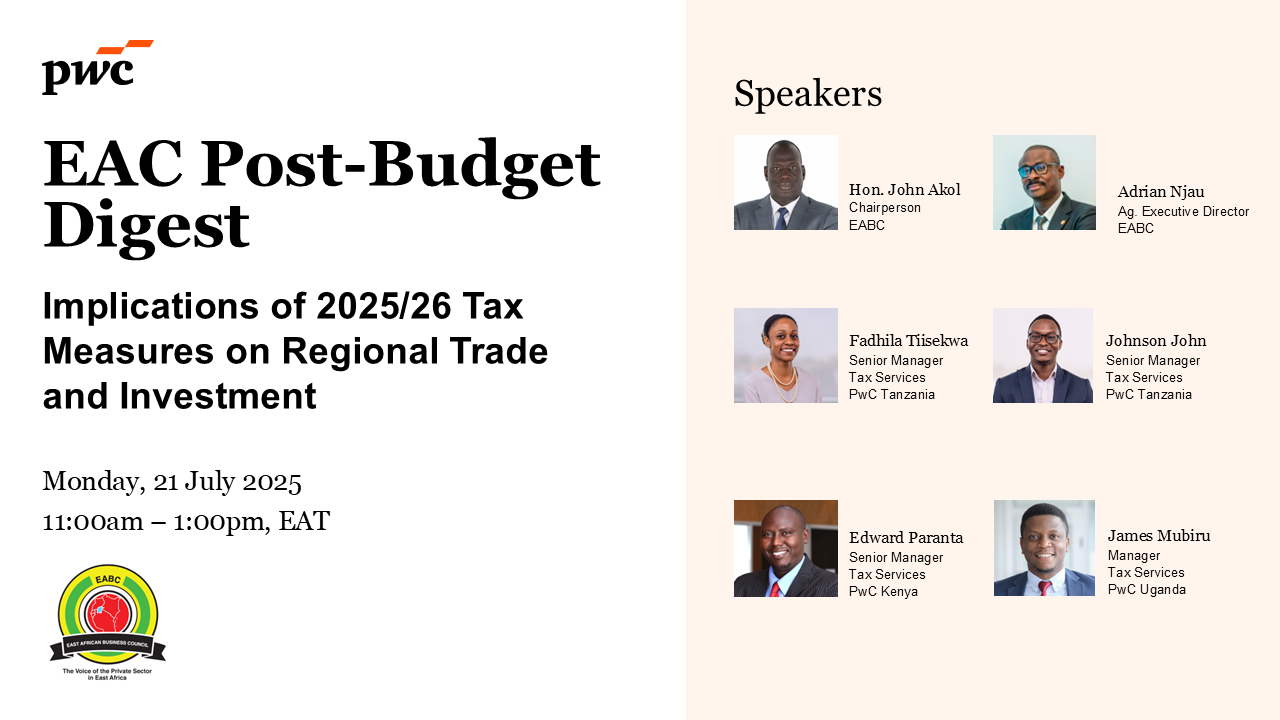Tuesday, 22nd July 2025, Arusha, Tanzania – Speaking during the Post-Budget Webinar for the 2025/26 Financial Year, themed “Implications of the 2025/26 EAC Tax Measures on Regional Trade and Investment”, organized by the East African Business Council (EABC) in collaboration with PwC, Hon. John Lual Akol Akol, Chairperson of the EABC, said “Governments of EAC Partner States should propose and adopt similar tax measures in the application of the EAC Common External Tariff (CET). A uniform CET is critical to stimulate growth intra-EAC trade”.
In his remarks, Mr. Adrian Raphael Njau, Acting Executive Director of the EABC, said “The EAC Secretariat and the private sector should jointly undertake analysis of Country-Specific Duty Remissions and Stays of Application before the EAC pre-budget consultations. The aim is to ensure that inputs or goods sufficiently available in the region are not granted remission or if not available countries should adopt regional wide duty remission. This will spur integration of regional industrial value chains.”
According to EAC Legal Notice No. EAC/171/2025 (dated 30th June 2025) and national Finance Acts, over 2,464 tariff lines (41.3%) have been adjusted through stays or remissions.
In 2024, the EAC’s total trade grew by 14.17%, rising from USD 109.4 billion in 2023 to USD 124.9 billion. Exports surged by 24.72% to USD 56 billion, while imports increased by 6.83% to USD 68.9 billion. Intra-EAC trade grew by 9.35%, reaching USD 15.2 billion (EAC Budget Highlights 2025). However, intra-EAC trade only accounted for 12.17% of total EAC trade with the world, indicating that 87.83% of EAC trade is still with external markets. This underscores the need to uniformly applying the EAC CET to deepen intra-EAC trade.
SoAs and SDRs undermine the EAC Customs Union by disrupting the uniform application of import duties. Final products benefiting from a country’s Specific Duty Remission but not meeting EAC origin rules are subjected to the full CET when traded within the region. These exemptions create an unleveled playing field, promote imports from outside the region, discourage investment, and hinder regional value addition and intra-EAC trade.
The EABC Post-Budget Webinar 2025/26 webinar attracted over 150 business leaders from the region and beyond. Participants received valuable insights from PwC tax experts on the 2025/26 Finance Acts of EAC Partner States. Mr. Jonathan Sessanga, EAC Principal Customs Officer – Information Technology, presented an update on the State of Play of the EAC Common External Tariff (CET). “There is an urgent need for structured consultations between governments and the private sector prior to the pre-budget cycles. This will help build consensus and undertake joint industrial mapping to determine which products genuinely require protection,” said Mr. Sessanga.
“EAC Partner States should adopt consistent and harmonized tax measures, while minimizing frequent annual changes. This will promote business predictability, boost investor confidence, and empower businesses to fully tap into opportunities under the EAC Customs Union and Common Market,” said Mr. Njau.
Key Recommendations from the Webinar:
- Uniform application of the EAC CET by all Partner States.
- Elimination of charges of equivalent effect on EAC-originating goods traded across Partner States.
- Structured pre-budget consultations to prevent stays of application and country specific duty remissions from undermining regional commitments.
- Annual reviews of stays to avoid distortions to intra-EAC trade.
- Promotion of a Regional Duty Remission or drawback scheme for industrial inputs.
- Actively engage the private sector in national pre-budget consultations to improve the business environment and ensure that proposed tax measures align with the objectives of EAC regional integration.
- Synchronize national pre-budget consultations across EAC Partner States and ensure the early release of Finance Bills to foster meaningful and timely private sector engagement.
- Eliminate discriminatory taxes on EAC‑originating goods that are not imposed on like or similar domestic products.
- Expedite harmonization of domestic taxes across EAC Partner States to position the bloc as the continent’s most attractive destination for investment.
- Ratify and implement the EAC Agreement for the Avoidance of Double Taxation


